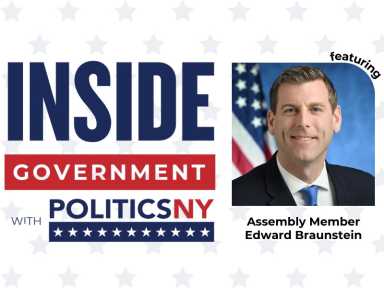
Inside Government is a Q&A series that gives New Yorkers a glimpse inside the role of the elected officials who represent them. This edition of Inside Government with PoliticsNY features New York State Assembly Member Edward Braunstein. Assembly Member Braunstein represents the 26th Assembly District in Queens which includes the neighborhoods of Auburndale, Bay Terrace, Bayside, Bayside Hills, Broadway-Flushing, Douglaston, Floral Park, Glen Oaks, Little Neck, New Hyde Park, North Shore Towers, Oakland Gardens, and Whitestone.
Q: What piece of legislation are you most proud to have passed this legislative session?
A: I worked with the NYC Mayor’s office to introduce the Supportive Interventions Act, (A.137). I’m pleased to report that many components of the bill were incorporated into the final state budget, including several policy changes relating to care coordination, involuntary commitment, and assisted outpatient treatment for individuals with mental illness. These measures will help prevent individuals experiencing severe mental health issues from falling through the cracks and support the overall safety of New Yorkers.
Q: How does your office work to support your constituents in their day-to-day lives?
A: From our district office on Bell Boulevard, my staff works hand in hand with constituents to solve a variety of state and city-related issues. We offer support in English, Chinese, Korean, Tamil and Malayalam. Additionally, regular social media postings, a monthly e-newsletter, and periodic mailed newsletters help keep constituents informed on the latest happenings in government and what programs and services are available.
Q: What is the most prevalent issue facing your constituents and how are you working to resolve it?
A: Public safety has always been a top priority. In this year’s budget negotiations, I pushed for measures that would protect our community. Previous discovery reforms opened loopholes that were allowing cases to be dismissed on minor technicalities. The state budget strengthened the discovery statutes to prevent these dismissals. Additionally, to help recruit and retain NYPD officers, we restored the 20-year service retirement and increased pension benefits for certain personnel who serve 25 years or more.
Q: What do you hope to accomplish by the end of 2025?
A: While session in Albany has wrapped up for the year, I look forward to continuing to tackle affordability. For example, my district is home to thousands of middle-class co-op owners who are struggling to comply with NYC’s Local Law 97. To assist, I introduced a state bill that would provide co-ops a property tax abatement for capital upgrades to reduce carbon emissions, lessening the burden placed on them by the City’s LL97.
Q: What is the proudest moment of your political career?
A: In 2019, I passed a bill that criminalized the unlawful dissemination or publication of intimate images, also known as “revenge porn”. Under the legislation, victims of revenge porn have the option to pursue a criminal case, a civil case, or both. The legislative change sent a strong message that individuals who engage in this type of reprehensible behavior will be held accountable for their actions.


